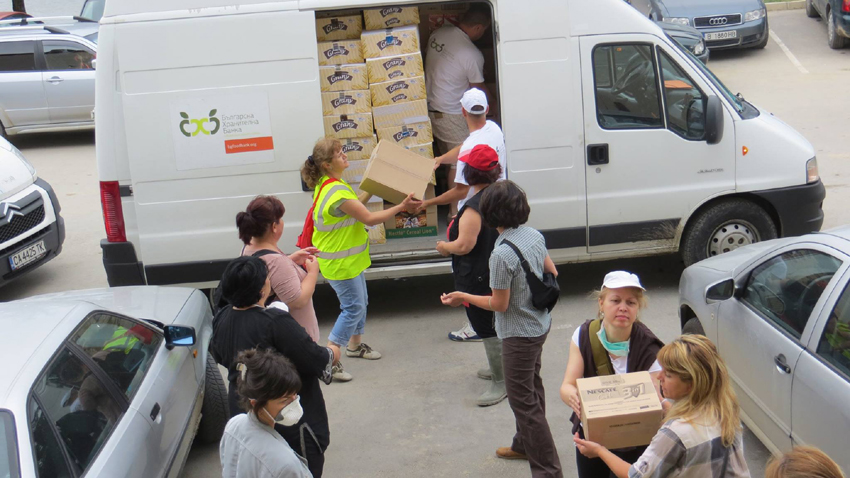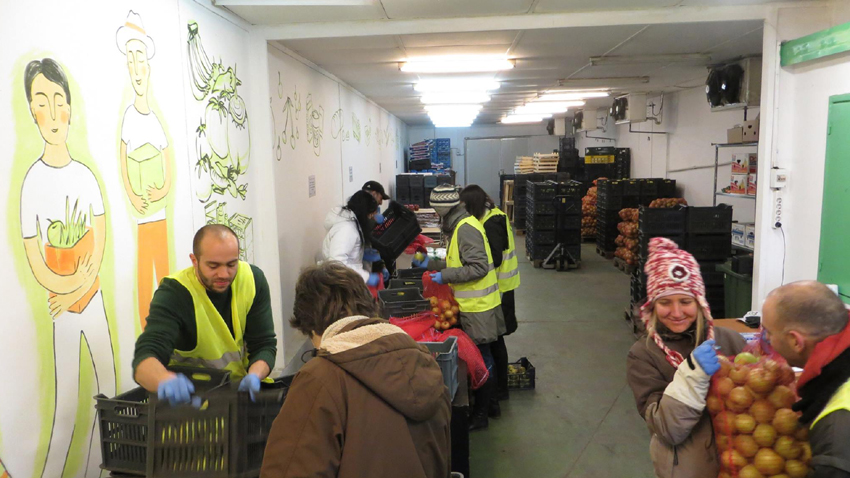Do you have the feeling that we live in Absurdland? One example: Over 1.3 billion tons of foods are thrown away worldwide due to the fact that the tomato is not red enough or the cucumbers are not equally straight etc. … while at the same time 850 million people starve. Bulgaria is not an exception. It wastes around 640 tons of food per year, or 90 – 100 kg per capita, though being known as one of the poorest EU member-states with over 1.5 million Bulgarians living on the threshold of poverty. American John van Hengel, aka the Father of Food Banking saw a solution to the problem back in 1967, when the first food bank was created in the USA. The tradition is more than 30 years old in Europe, but in Bulgaria it appeared barely 3 years ago. For the moment it manages to save around 260 tons of food per year. “This is less than 1 percent from the huge quantity lavished,” said for Radio Bulgaria Bulgarian Food Bank CEO Tsanka Milanova. There are many reasons for that. The lack of good donation and volunteering traditions is one of those, as well as the strict legislation, related to requirements for safe transportation and preservation of foods. That is why people cannot donate products. However, the 1 kg of Goodness campaign was organized last year by the food bank on the territory of several retail chain stores, in order for those to be able to reach the Bulgarians. A total of 6,000 people responded over its two editions by purchasing and donating 17 tons of products like rice, beans, pasta, olive oil, flour, sugar etc. “This is non-perishable packed food, which we don’t often receive from another source, as it is easy to sell and usually has a longer shelf life,” Mrs. Milanova explains. According to her, the other serious issue is that Bulgaria is the only European country, which hasn’t found a legislative regime, stimulating donation of food.

“A producer, processor or trader has to pay 20 percent of VAT, if he decides to donate some food – often simply exceeding the quantities needed”, Mrs. Milanova goes on to say. “In other cases it is a matter of problems with damaged outlook of a produce, or of human mistakes at its labeling. At the same time such food is of interest to us. However, we find it hard to persuade the producer that it will be wiser to donate, as it is several times cheaper to destroy. The incinerating of animal products is the most expensive action, as in all other cases the food is simply thrown away.”
That is why the food bank’s representatives will insist on a change in the VAT Act and for the adoption of measures, encouraging donations. Large companies, representatives of the global commercial networks are among the main donators of food here. Besides that the milk processing and producing sector is the most active one for the moment.

“42 percent of all food that reached us in 2014 was milk, dairy products and desserts,” Mrs. Milanova says. “So far we have very little cheese, but donations of that kind have started as well. Smaller traders of fruits and vegetables are another part of the donators, as they are situated close to our central logistics warehouse – next to the biggest market for fruits and vegetables in Sofia. We visit each trader’s warehouse with the help of our volunteers. They know us well now and we collect goods that do not look well and have slight deviations in quality. Then we put tremendous efforts in the sorting of this food – the saved part reaches the tables of children and young people at risk yet on the same day…”
English version: Zhivko Stanchev
Photos: Bulgarian Food BankSkopje aims to attract cargo from Europe to Thessaloniki with a new railway line The construction of the railway line along Corridor 10 is a priority for North Macedonia, said North Macedonia’s Minister of Transport Aleksandar Nikoloski. He..
Language and cultural workshops "My Bulgarian Summer" once again take the children of Bulgarians living abroad to some of the most beautiful places in the country. A series of trips for children and students from 6 to 15 years of age..
The Bulgarian language is studied academically in Albania, much like in many other places around the world. Our lectorat is part of the Department of Slavic and Balkan Languages at the Faculty of Foreign Language Studies at the University of Tirana, and..
Skopje aims to attract cargo from Europe to Thessaloniki with a new railway line The construction of the railway line along Corridor 10 is a..

+359 2 9336 661
